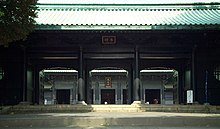Hayashi Gakusai
| Hayashi Gakusei | |
|---|---|

Hayashi Gakusei, 10th rector of Yushima Seidō.
|
|
| Born | 1833 Edo |
| Died | 1906 Edo |
| Occupation | Neo-Confucian scholar, academic, administrator, writer, diplomat |
| Subject | Japanese history, literature |
Hayashi Gakusai (林 学斎?, November 12, 1833 – July 14, 1906), formerly Hayashi Noboru, was a neo-Confucian scholar and a bakufu official in the late Tokugawa shogunate.
Hayashi Daigaku-no-kami Gakusai was a member of the Hayashi clan of Confucian scholars, each of whom were ad hoc personal advisers to the shoguns prominent figures in the educational training system for the bakufu bureaucrats. The progenitor of this lineage of scholars was Hayashi Razan, who lived to witness his philosophical and pragmatic reasoning become a foundation for the dominant ideology of the bakufu until the end of the 19th century.
This evolution developed in part from the official Hayashi schema equating samurai with the cultured governing class (although the samurai were largely illiterate at the beginning of the Tokugawa shogunate). The Hayashi helped to legitimize the role of the militaristic bakufu at the beginning of its existence. His philosophy is also important in that it encouraged the samurai class to cultivate themselves, a trend which would become increasingly widespread over the course of his lifetime and beyond. One of Hayashi Daigaku-no-kami Razan's aphorism encapsulates this view:
The Hayashi played a prominent role is helping to maintain the theoretical underpinnings of the Tokugawa regime; and Hayashi Daigaku-no-kami Gakusai was the 12th hereditary rector of Yushima Seidō.
The privileges and honors he and his family and his clan had enjoyed up through 1867 were stripped from them during the turmoil which accompanied the Meiji Restoration in 1868.
Hayashi Noboru's signature can be found on the Japanese translation of the Dutch text of the agreement negotiated between Commodore Perry and Daigaku-no-kami Hayashi, implying some degree of participation in this historic negotiation.
...
Wikipedia
